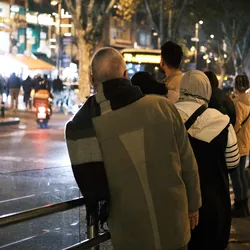
Level 1:
Queuing is very important in the UK. It means waiting in a line. Brits like queuing a lot. You have to wait for your turn. Cutting in line is bad. People will get upset if you cut in line. Queuing is fair. Everyone has a chance to get what they want. People can talk and make new friends when queuing. Queuing is good for emergencies, like during COVID-19. Queuing is fun at Wimbledon and Harry Potter studio tour. Queuing is part of UK culture.
Level 2:
Queuing is an essential part of the culture in the United Kingdom, where waiting patiently in a line is highly valued. The British are known for their love of queues, and they follow certain rules when queuing, such as not cutting in line. The queue is seen as a democratic system where everyone has an equal opportunity to get what they need, regardless of their status or social class. Queuing etiquette is so important that it is even taught in schools as a fundamental British value. Queuing can also be a social experience where people strike up conversations or offer to hold someone’s place. In times of emergency or crisis, queuing demonstrates resilience and solidarity. Famous queues include the Wimbledon tennis tournament and the Harry Potter studio tour in London.
Full Story:
Let’s talk about the great British tradition of queuing! Yes, you read that right, queuing, waiting in line, is a fascinating aspect of UK culture that is often overlooked. Despite its mundane nature, queuing plays a significant role in shaping the social fabric of the country, and understanding it can give outsiders a unique insight into British culture.
Queuing is an essential part of everyday life in the UK. Brits are known for their love of queues, and queuing is a way of life that is deeply ingrained in the country’s psyche. Whether it’s waiting in line at the supermarket or standing in line for hours to get into a popular attraction, Brits are experts at queuing. They take it very seriously and expect others to do the same.
In fact, the British have developed an unwritten code of conduct with queuing. Cutting in line is a social taboo, and those who dare to break the queue are likely to be met with a stern telling off or a cold stare from their fellow queuers. The queue is seen as a democratic system where everyone has an equal chance to get what they want, regardless of their status or social class.
Queuing etiquette in the UK is so important that it even made its way into the national curriculum. In 2016, the Department of Education included queuing in its list of fundamental British values that should be taught in schools. The official guidance states that “an understanding of how to queue and take turns is essential for effective participation in a modern democracy.”
But queuing is not just about following rules and waiting patiently. It also has a social aspect. Queuing can be a way of making new friends or striking up a conversation with a stranger. People in the queue will often chat with each other, share stories, or even offer to hold someone’s place if they need to step away for a moment.
Queuing also brings out the best in people. In times of crisis or emergency, Brits have shown remarkable resilience and solidarity by queuing up patiently to receive aid or assistance. For example, during the COVID-19 pandemic, people queued for hours to get tested, vaccinated, or to buy essential goods like toilet paper and food. They did so without complaining, knowing that queuing was necessary to prevent the spread of the virus.
Queuing has also inspired some quirky traditions in the UK. One such tradition is the annual queue for the Wimbledon tennis tournament. Fans queue for days, even weeks, to get a chance to watch the matches in person. The queue is so popular that it has become a social event in itself, with people bringing tents, chairs, and even barbecues to make the wait more enjoyable.
Another famous queue is the one outside the Harry Potter studio tour in London. Fans of the wizarding world can wait for hours to get a glimpse of the movie props and sets. But the wait is worth it, as they get to immerse themselves in the magical world of Hogwarts and take pictures with their favourite characters.
In conclusion, queuing may seem like a mundane aspect of everyday life, but it is a quintessential part of UK culture that deserves recognition. waiting in line has shaped the British identity and has become a symbol of social order, solidarity, and democracy. So, next time you visit the UK, embrace the queuing culture, and you may just discover a new way of connecting with the people around you.
Questions:
What is the unwritten code of conduct with queuing in the UK?
Why is queuing important for effective participation in a modern democracy, according to the Department of Education?
How has queuing brought out the best in people during the COVID-19 pandemic?
Do you think queuing is an effective way to prevent the spread of the virus? Why or why not?
In your opinion, what is the most interesting tradition or event associated with queuing in the UK?
Do you like to wait in long lines?
How do you feel being in a long line?
Fill In the Blanks:
upset, fair, Wimbledon, queuing, Brits, emergencies, Queuing
Let’s talk about the great British tradition of ________!
________ is an essential part of everyday life in the UK.
________ are known for their love of queues, and queuing is a way of life that is deeply ingrained in the country’s psyche.
One such tradition is the annual queue for the ________ tennis tournament.
People will get ________ if you cut in line.
Queuing is ________.
Queuing is good for ________, like during COVID-19.
Difficult Words:
queuing - waiting in line
Brits - British people
cutting in line - when someone goes to the front of the line without waiting their turn
upset - to be angry or annoyed
fair - treating everyone equally
emergencies - unexpected and dangerous situations
COVID-19 - a highly contagious virus that has caused a global pandemic
Wimbledon - a prestigious tennis tournament held in London, England
Harry Potter studio tour - a tour of the film studios where the Harry Potter movies were made in London, England




